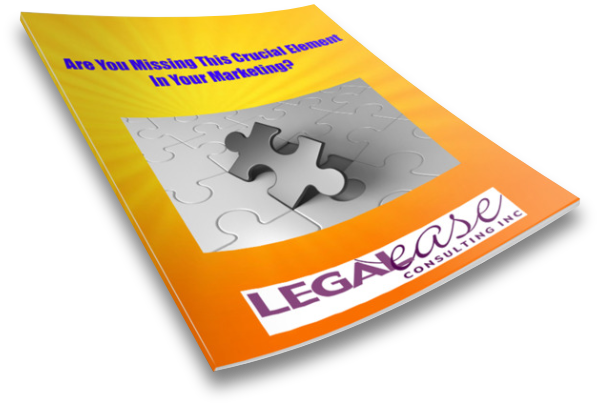Does providing excellent client service mean you have to be tied to clients 24/7?
Dan Hull, who writes the respected What About Clients blog thinks lawyers should be there for clients — 24/7. I agree with Dan when he says,
In the next decade, and even for high-end clients, more and more “cookie cutter” and fungible services will be outsourced and done by very smart and far more cost-effective workers and professionals in Bangalore, Taipei or Mexico City. Just wait. What’s left over will be specialty items and things clients need professionals and specialists to do at their highest levels of thinking and problem-solving.
This may very well be the ‘wave of the future’ for legal practices. That’s why lawyers need to differentiate themselves from the competition, whether that competition is down the street or across the world. It’s why lawyers have to focus more on what their clients really want, and on finding innovative ways to meet not just the needs and wants that clients openly express, but needs and wants that are below the surface.
Where I disagree with Dan is in the premise that providing your clients with the best service always means being available 24/7. For certain types of law practices, being available for your clients at all hours of the day and night, seven days a week might be necessary – a criminal practice comes to mind. If a client is arrested, they need legal counsel fast. And in that situation, if you’re not available, you might lose that client. And if your practice is international in nature and you’re dealing with clients in different time zones, chances are that you’re going to be available on a different schedule than someone with a purely local practice.
Attorneys are not royalty, as Dan says. But it doesn’t necessarily follow that today’s marketplace or the marketplace ten years from now requires that attorneys be available to their clients around the clock. I’m sure that many will disagree with me, but being available around the clock may not be the best strategy for you or your clients, even if clients say that’s what they want.
It may seem like a radical point of view, but consider the possibility that being always available can diminish the value of your services. Although clients may say they want the cheapest lawyer, they really want the best representation they can get – they want the best value. Being the most available can undervalue your services in the same way that being the ‘cheapest’ can. As Dan Kennedy suggests in some of his teachings about marketing and running a business, nobody lines up to seek the advice of the old man at the bottom of the mountain. It’s the wise man at the top of the mountain that people line up to see – and that people make sacrifices to see.
I’m not suggesting that attorneys should make themselves unavailable merely for the sake of making themselves unavailable. But remember that your best clients are the ones that seek out your advice and that trust and respect you and your judgment. If you’ve built the right relationships with your clients and if you’ve positioned yourself in a way that takes advantage of your own unique talents and skills and you serve clients in a way that no other lawyer does, existing clients, and even potential clients, won’t be too eager to throw that away to take a chance on someone else merely because they claim to be available 24/7.
I’ve said before that sometimes being too available hurts both the lawyer and the client. Again, a lot depends on your individual practice, your practice area, and the client. But being too available can make the client too dependent on the attorney, and can unnecessarily inflate legal fees. It can be the cause of poor performance, distracting the attorney from the task at hand and from the client who’s looking for assistance. I’ve worked with and have personal relationships with attorneys that are available 24/7. Many times, their clients are unnecessarily demanding because they know the attorney is ‘available’ 24/7. Often, they’ve got high stress and high blood pressure, and they never really re-charge. That isn’t good for them, their families, or their clients. They may be ‘successful’ in that they make a lot of money, but is that the only definition of success?
By contrast, I know attorneys that restrict their availability, albeit for good reason. They explain to clients that when they’re involved in a trial (for example), they don’t take other client calls. The client can call the office and get assistance from someone else. If it’s a real emergency, the lawyer’s office is instructed when and how to contact the attorney, but the client isn’t given direct access. The clients respect this, knowing that when their case is being tried, they’ll get the attorney’s full attention.
All of that being said, depending upon your practice area, it’s a good idea to set up systems to ensure that there is a mechanism in place for clients to get to you if they have a true emergency. Dan says that, “no client worth keeping will abuse the privilege.” This may very well be true, but sometimes it’s tough to discern which clients are worth keeping from the outset. Giving all clients unfettered access to you at all times is, in my humble opinion, a mistake. Instead, if you’ve got a client with whom you’ve established a trusting relationship that goes both ways, feel free to give them access that you deem appropriate, and make sure they understand the uses of that access.
If you’re working in a firm and can establish a system whereby a client gets immediate help from someone, and that you can be reached if necessary, that makes more sense than providing everyone with your personal contact information. Often, if a client trusts you, they’ll trust your staff and they’ll also trust your discretion about how a particular matter or problem should be handled, and by whom. Much of this is a matter of setting expectations with clients at the outset and establishing a good relationship.
Dan Hull contends that in order to be competitive, we have to ‘be there’ for our clients 24/7. I’m not sure that’s true, and particularly not in all practices. A lot of discussion about availability comes from a scarcity mentality – it’s based on the assumption that there aren’t enough clients to go around and that lawyers are all fighting over the same small pool of clients. But if you’ve positioned yourself in such a way that you’re providing service that others aren’t providing, being always ‘on call’ may not be necessary.
I also disagree with Dan’s contention that not being available 24/7 is arrogant, spoiled and stupid – in fact, I think it can be good business, and that it can benefit both the lawyer and the client.
If you liked these articles, subscribe to my e-newsletter, and you’ll receive new articles in your in-box. The articles in the newsletter are not available to the public – the only way to see those articles is to receive the newsletter.
Already a subscriber? Want to learn how I can help you? Learn more about the products and services I offer by clicking here.

Allison C. Shields
Legal Ease Consulting, Inc
Creating Productive, Profitable and Enjoyable Law Practices

P.S. Found a mistake or a bug? If there’s anything that bothers you about this site, I want to know! Send me an email at Allison@LegalEaseConsulting.com. I want this site to be not just a resource, but a refuge for lawyers. I want you to be comfortable here. So if there’s something that bothers you, please tell me!



